
|
|
(chronologically, by film title) Intro | Summary Chart | Silents-1949 | 1950 -1966 | 1967-1969 | 1970-1974 | 1975-1977 | 1978-1979 1980 | 1981 | 1982 | 1983-1984 | 1985-1986 | 1987-1989 1990-1991 | 1992-1994 | 1995 - 1 | 1995 - 2 | 1996-1997 | 1998 | 1999 | 2000 | 2001 - 1 | 2001 - 2 2002 - 1 | 2002 - 2 | 2002 - 3 | 2003 | 2004 | 2005 | 2006 | 2007-2011 | 2012-2014 | 2015-2017 | 2018-2019 | 2020-2021 |
|
| Film Title, Director, Studio, Budget Information, Description | |
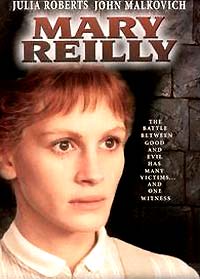
|
Mary Reilly (1996) This suspenseful, atmospheric, psychological melodrama's tagline -- "The Battle between Good and Evil has many Victims...and one Witness" -- described this disturbing version of writer Robert Louis Stevenson's novella "The Strange Case of Dr. Jekyll and Mr. Hyde" first published in 1886, adapted from Valerie Martin's 1990 best-selling novel. The underrated, possibly misunderstood film looked promising, with accomplished director Frears (already known for Dangerous Liaisons (1988), The Grifters (1990), and Dirty Pretty Things (2002)), and cast (Julia Roberts, John Malkovich, and Glenn Close), although it turned out to be a critical and financial flop. Negative word-of-mouth pre-release publicity about on-set cast conflicts and news of other production delays doomed the film. The slow-paced film was told from the sexually-charged yet complacent viewpoint of a grim-looking, downcast-eyed, naive and vulnerable, and mis-cast Julia Roberts as the title character Mary Reilly, a newly-hired Irish maid-servant in the huge London house of Dr. Henry Jekyll in the late 1800s. The dual role of Jekyll and Hyde was performed by the exceptional actor John Malkovich. Flashbacks told about Mary's abused and tortured childhood from her drunken father (with her scarred hands and neck due to rat bites), and in a strange way, a twisted romantic attraction developed between the pallid-faced, timid Mary and Jekyll's passionate "new assistant" -- Mr. Edward Hyde -- after Jekyll took an experimental potion. The mis-marketed film (as a straight horror film) was plagued by studio and director squabbles over the script and numerous rewrites, mostly regarding the downbeat ending (in which Hyde injected himself with a poisonous substance and expired). It was praised more for its desaturated look, production values and Gothic ambiance than its true shock value (in a few select scenes including the "child stomping" scene, the eel-skinning scene, and the blood-splattered scene in the prostitute's bedchamber). It received two Razzie Award nominations: Worst Actress (Roberts) and Worst Director. Highly-paid star Julia Roberts had a number of other film failures in the early 1990s before this film, including Dying Young (1991), I Love Trouble (1994), Pret-A-Porter (1994), and Something to Talk About (1995). |
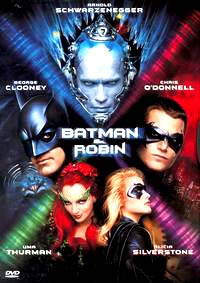
|
Batman & Robin (1997) Joel Schumacher's fast-paced but directionless, lightweight and mind-numbing filmed sequel (the fourth one in the Batman series after Tim Burton's Batman (1989), Burton's sequel Batman Returns (1992), and Schumacher's own Batman Forever (1995)) was devoid of a good script although written by Akiva Goldsman (for example: Robin: "I want a car. Chicks dig the car, right?"), acting on the part of its talented cast, or directorial vision, although its predecessor in 1995 was a major hit. This campy and foolish retread had marvelous sets, gaudy costumes, and production-design values, but turned out to be laughable in the worst way, with senseless action sequences and visual overload. It was over-hyped and marketed, insuring some decent box-office returns, but the resultant word-of-mouth made it anything but a sure-fire hit. The only thing it delivered was product merchandising, toy and fast-food tie-ins. George Clooney never heard the end of it for his dual role as Bruce Wayne and as the rubber-nippled caped crusader Batman (taking over from Val Kilmer) with a codpiece, nor Chris O'Donnell as the egotistical spoiled brat sidekick Robin. The blockbuster film introduced the character of motorcycle racer and martial arts expert Batgirl (Alicia Silverstone), the villainous, redheaded, predatory, eco-bad dominatrix Poison Ivy (Uma Thurman) with a toxic kiss, and ghastly-looking, red-eyed, head-shaved ex-scientist Mr. Freeze (Arnold Schwarzenegger) -- a Michelin-Man-like Robocop-Terminator who served as a frosty gray-blue Gotham City foe, with lots of awful "cold"-themed one-liner quips (i.e., “The ICEMAN cometh” and "Let’s kick some ICE”). This big-budget, cartoonish (without the "POW" and "WHAM" balloon graphics of the 60s TV show) special-effects laden, video-game-like film completely misjudged its devoted audience. As a result, it received 11 Razzie Award nominations including Worst Director, Worst Original Song - "The End is the Beginning is the End", Worst Picture, Worst Reckless Disregard for Human Life and Public Property, Worst Remake or Sequel, Worst Screen Couple (George Clooney and Chris O'Donnell), Worst Screenplay, Worst Supporting Actor (O'Donnell), Worst Supporting Actor (Arnold Schwarzenegger), and Worst Supporting Actress (Uma Thurman), and won one Razzie for Worst Supporting Actress (Alicia Silverstone). |
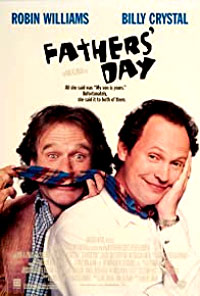
|
Fathers' Day (1997) Director: Ivan Reitman Studio/Distributor: Northern Lights Entertainment Budget: $85 million Domestic Gross: $28.6 million Worldwide Gross: $35.7 million Total Net Loss: $67 million Total Estimated Loss (Inflation-Adjusted): $113 million |
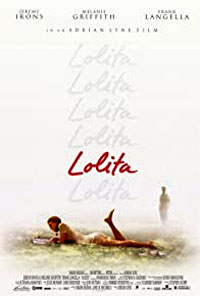
|
Lolita (1997) Director: Adrian Lyne Studio/Distributor: Guild Budget: $62 million Domestic Gross: $1.1 million Worldwide Gross: $1.1 million Total Net Loss: $61 million Total Estimated Loss (Inflation-Adjusted): $103 million |
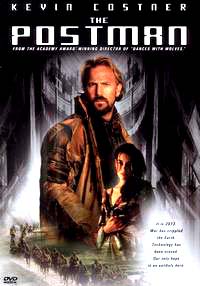
|
The Postman (1997) Star/director and producer Kevin Costner's and Warners' over-long futuristic sci-fi western epic placed Costner in the title role as a Shakespeare-quoting, Messiah-like postman (with homage to the Australian Mad Max films and various westerns). The sometimes laughable film was budgeted at $80 million, with domestic box-office of only about $18 million. It was based on David Brin's 1985 award-winning, fantasy, post-apocalyptic novel, co-scripted by Eric Roth and Brian Helgeland. The failed film was another version of Costner's oft-repeated character -- a cynical loner (and unwilling anti-hero) in a wilderness setting, who rallied a community against evil anarchic forces, as he did in his Best Picture-winning Dances with Wolves (1990) and Waterworld (1995). The dragged-out and pretentious, but visually-impressive epic motion picture was a mind-numbing three hours in length, with a poorly-written but emotionally-manipulative script, a brooding and solitary main character, and mishandled direction. The film's plot was about a nomadic, laid-back post-apocalyptic, nameless drifter-hero in the year 2013, who with his mule Bill, traversed the briny wasteland, when he came upon the remains of a Union 76 service station -- a symbolic allusion, and a small community. There, he delivered a one-man Shakespearean show, but was conscripted by the Holnists led by cruel tyrant and fascist dictator General Bethlehem (Will Patton). Shortly afterwards, he became a rebellious fugitive on the run from totalitarianism after escaping the Holnists' mining pit base camp. He took his nickname The Postman when he sought shelter in a broken-down US Postal Service mail carrier van full of sacks of 15 year-old undelivered mail with the skeleton of the dead mail-carrier, and began delivering letters (in the postman's uniform) and patriotic-sounding, flag-waving speeches about the "Restored US Government" to members of the small town of Pineview. He was meant to be a savior to represent the restored and reformed United States - to provide motivation for the townsfolk to look forward to a more democratic and hopeful future of a revived New America, populated by multiple postalmen and women delivering mail to the isolated communities in the Pacific Northwest to reunite them. The film's love interest, a young married Oregonian woman named Abby (British actress Olivia Williams) who wanted the Postman's semen due to her obliging husband's infertility (and then was seen semi-nude in an extended sex scene with Costner), told the messianic Postman: "You give out hope like it was candy in your pocket" -- this quote was representative of the hokeyness and questionable nature of this good-hearted, cloyingly sentimental, sincere, but heavy-handed and individualistic film statement that only the vain, self-glorifying Costner could deliver as the film's mythic figure. The notorious film won all five of its Razzie nominations: Worst Actor and Director (Costner), Worst Original Song - for the entire song score, Worst Picture, and Worst Screenplay. It also was honored with a Razzie nomination for the Worst Picture of the Decade in 2000, but lost to Showgirls (1995). |
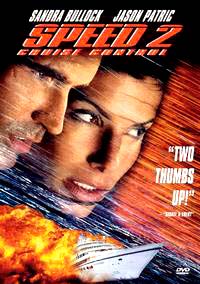
|
Speed 2: Cruise Control (1997) Jan de Bont's boring, uneven and predictable sequel moved the action from a runaway bus in Speed (1994) to a runaway cruise ship named Seabourn Legend, an unlikely-to-please plotline similar to the story in the action-thriller Under Siege (1992) with Steven Seagal, and a version of Die Hard (the story of the film was originally devised for the third film in the Die Hard series). The Razzie Awards nominated the stinker film for eight nominations (Worst Actress (Sandra Bullock), Worst Director, Worst Original Song -- "My Dream", Worst Picture, Worst Screen Couple (Bullock and Jason Patric), Worst Screenplay, and Worst Supporting Actor (Willem Dafoe)), with one win for Worst Remake or Sequel. Its reception was lukewarm and negative word-of-mouth guaranteed its failure. Even major star Bullock called the commercially-unsuccessful film: "the biggest piece of crap ever made." This noisy, blockbuster disaster epic had the requisite action sequences, but they had no verve or tension, and they mostly consisted of jerky and shaky camera movements and cliched and formulaic events. Sandra Bullock reprised her role as Annie Porter, and Jason Patric replaced cop-lover Keanu Reeves (as Jack Travern) from the original film as new LAPD cop-boyfriend Alex Shaw, accompanying her on a get-engaged cruise to the Caribbean on a ship also occupied by disgruntled, sociopathic ex-cruise ship computer expert John Geiger (Dafoe). The eccentric villain, while hijacking the ship and stealing passengers' diamonds, applied leeches to his body to suck out the copper poison that had lethally sickened him. In the film's drawn-out finale, the gigantic luxury liner cruised straight into a tourist-filled coastal town, with hardly any of the victims aware of the impending danger as everything was wrecked in its path. |